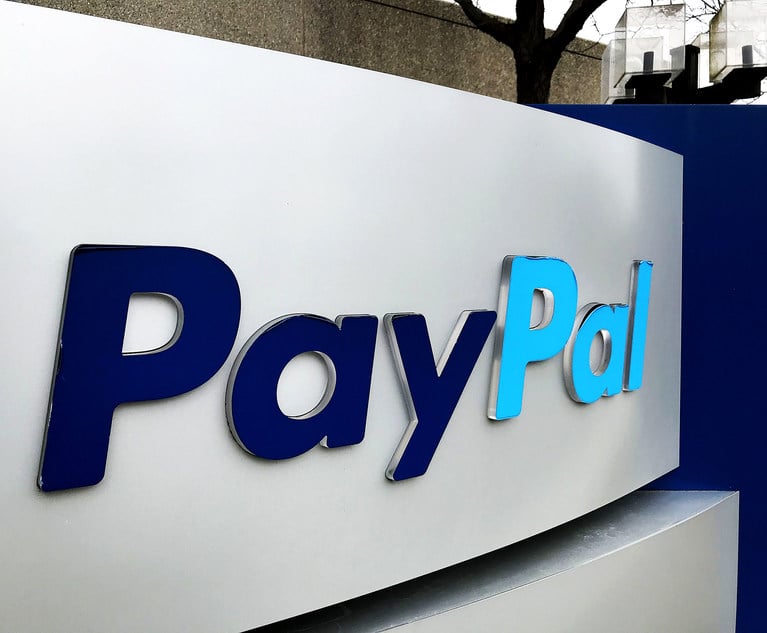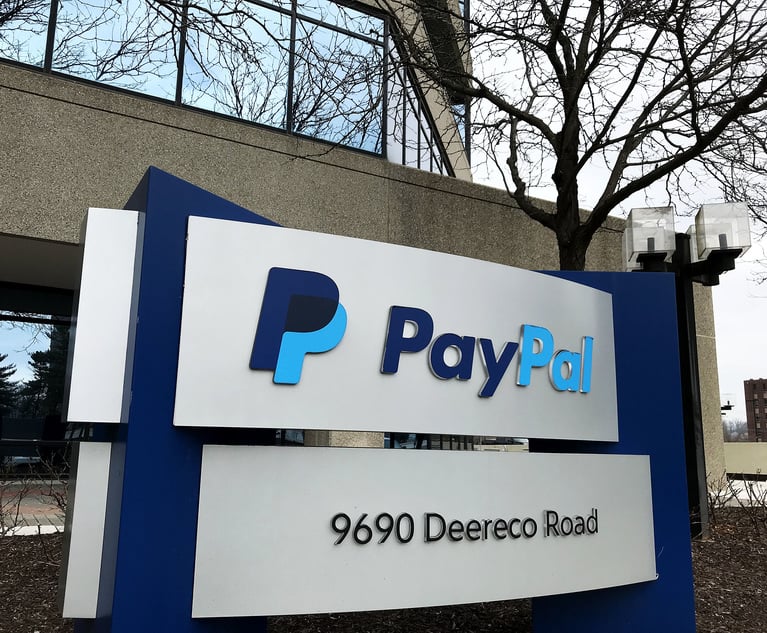New CLO of TrustToken on the Hectic Cryptocurrency Regulatory Environment, Outside Counsel Needs
TrustToken's Alex C. Levine recently spoke about his company, its regulatory challenges and what he looks for in outside counsel.
September 25, 2018 at 06:21 PM
7 minute read
The original version of this story was published on Corporate Counsel
 Alex C. Levine. Courtesy photo
Alex C. Levine. Courtesy photo
Alex C. Levine recently was named chief regulatory officer and head of legal for TrustToken Inc. based in San Francisco. TrueCoin LLC, a subsidiary of TrustToken, is the issuer of TrueUSD, a stable-value cryptocurrency (stablecoin) tied one-to-one to the U.S. dollar.
Levine, 40, has been a regulatory attorney and executive focusing on securities and derivatives law, and more recently on cryptocurrency, for more than 15 years. He has held senior-level legal posts at the U.S. Commodities Futures Trading Commission and the U.S. Securities and Exchange Commission during the regulatory response to the financial crisis and rule-making under the Dodd-Frank Act, according to the company.
He also has been chief compliance officer and head of legal at LedgerX, a derivatives exchange and clearinghouse for cryptocurrencies; and general counsel and chief compliance officer of the hedge fund Gladius Capital Management LP.
Levine, who has a law degree from Stanford University Law School and a master's degree in business administration from the University of Chicago Booth School of Business, began his career as an associate at Kirkland & Ellis. He recently spoke to The Recorder affiliate Corporate Counsel about his company, its regulatory challenges and what he looks for in outside counsel. This interview has been edited for clarity and length.
Corporate Counsel: TrustToken Inc. is a one-to-one stable dollar cryptocurrency launched earlier this year, similar to Gemini Trust and Paxos Trust offerings that were recently licensed by the New York Department of Financial Services. What is the principal advantage of your product?
Alex C. Levine: Since we do not run an exchange, we have the ability to list in any exchange globally that would like to have our product. As a result of that agnostic change characteristic, we have a broader reach globally.
Who would be interested in this?
Traders in general looking to get in or get out of more volatile (cryptocurrency) like bitcoin or ethereum. This provides the ability to execute arbitrage or seek a safe haven. It provides the ability to use cryptocurrencies without having to constantly move in and out through a more cumbersome process.
How is TrustToken regulated?
The issuer of TrueUSD, TrueCoin LLC, has been registered and licensed since March 2018 as a Money Services Business with the Financial Crimes Enforcement Network, which is a bureau of the U.S. Department of the Treasury. No other registrations or licenses have been obtained as of yet. The issuer of TrueUSD has not registered with, nor sought to obtain, a BitLicense with the New York State Department of Financial Services, because no business occurs in New York and no purchases or redemptions are allowed by New York residents.
What legal or regulatory challenges does TrustToken face?
For companies within the blockchain-cryptocurrency space, such as TrustToken, the greatest regulatory challenge is the myriad of competing and developing regulatory requirements from different jurisdictions. Currently, U.S. regulators such as the SEC, CFTC, FinCEN, and OCC at the federal level, along with financial departments at 50 states plus territories, all have purview over cryptocurrency. Also, given the borderless nature of cryptocurrencies, there are scores of additional regulators in countries across the world, especially in Europe and Asia, that are developing their own regulatory regimes.
To state the obvious, all these regulatory bodies have competing interests and viewpoints. From a legal risk-management perspective, this makes it very difficult to cognize an overall regulatory framework for cryptocurrency, and to institute change-management procedures that can proactively respond to new regulations.
Is it difficult to find legal talent to deal with cryptocurrency?
I think it is. It is a very new area and we are figuring it out as we go. A lawyer with 50 years of experience may not be able to add any more value than one with five years' experience. There is the issue of finding people who are steeped in the space. That can be difficult. And it brings together a lot of issues that have never been brought together. For crypto, the SEC and CFTC are both regulators with jurisdictional hooks. You have lawyers who are SEC or CFTC experts and they can give you an answer, but they don't tell you what the other regulators think. So in a sense, the lawyers who are steeped in both regulatory worlds are very few. It's hard to get that perspective on how it's tied together.
On whom do you rely for outside legal counsel?
I rely on Katten Muchin Rosenman and Gary de Waal, who has deep expertise in this space. Also Orrick, Herrington & Sutcliffe for corporate structuring in the U.S. and elsewhere; the partner we have been working with is Joseph Perkins.
What kind of background or expertise is useful in virtual currency lawyers?
A technical or finance background is helpful, but lawyers who think about things from risk-management and finance perspective are most helpful. Before the crypto boom, talking to a regulator was a bad thing but now you want to proactively engage regulators.
What drew you to this niche as a career?
I found it intellectually to be a challenge … the whole intellectual and logical formulation around crypto was fascinating. Having the opportunity to do that, and combine intellectual curiosity and the regulatory [aspect]. The crypto regulatory world is moving at extraordinary speed, compared to what the regulatory world usually does. I don't think that happens but once in a generation or once in a lifetime. It makes me excited to get up to work every day. That is what drew me here and is keeping me here.
Finally, how would you as a chief legal officer like to see the regulatory hurdles or challenges of cryptocurrency companies like yours be addressed?
The best ways for this to be addressed would be threefold, with the goal of fostering consistency of regulation and expertise within regulatory bodies for addressing a maturing cryptocurrency landscape.
First, within the United States, many of the competing regulatory issues that exist between the federal and state regulators could be solved if Congress updates the current securities and commodities laws to assert jurisdiction at the federal level over spot transactions in cryptocurrency.
Second, until Congress takes such action—if ever—regulators in the United States could work together to share expertise and engage the crypto industry to ensure, at the very least, that the multiple regulatory frameworks are not at odds with each other.
Third, regulators across the globe could come together and agree on a set of principles to guide the creation of regulatory frameworks in different jurisdictions to adopt regulatory best practices. That would ensure consistency in the principles guiding their design, similar to the international standards put forth in the Principles for Financial Market Infrastructures issued by the Bank for International Settlements.
Read more:
NY AG's Report on Crypto Exchanges Faces Backlash
Two Stable Cryptocurrencies Are Approved by NY Regulator
Crypto Hiring Spree in Legal Continues with CCO Move to K2 Intelligence
This content has been archived. It is available through our partners, LexisNexis® and Bloomberg Law.
To view this content, please continue to their sites.
Not a Lexis Subscriber?
Subscribe Now
Not a Bloomberg Law Subscriber?
Subscribe Now
NOT FOR REPRINT
© 2025 ALM Global, LLC, All Rights Reserved. Request academic re-use from www.copyright.com. All other uses, submit a request to [email protected]. For more information visit Asset & Logo Licensing.
You Might Like
View All
'It's Not Going to Be Pretty': PayPal, Capital One Face Novel Class Actions Over 'Poaching' Commissions Owed Influencers

'Biggest Influencer Scam of All Time'?: PayPal Accused of Poaching Commissions Via Its 'Honey' Browser Extension


Trending Stories
- 1'Something Else Is Coming': DOGE Established, but With Limited Scope
- 2Polsinelli Picks Up Corporate Health Care Partner From Greenberg Traurig in LA
- 3Kirkland Lands in Phila., but Rate Pressure May Limit the High-Flying Firm's Growth Prospects
- 4Davis Wright Tremaine Turns to Gen AI To Teach Its Associates Legal Writing
- 5'Battle of the Experts': Bridgeport Jury Awards Defense Verdict to Stamford Hospital
Who Got The Work
J. Brugh Lower of Gibbons has entered an appearance for industrial equipment supplier Devco Corporation in a pending trademark infringement lawsuit. The suit, accusing the defendant of selling knock-off Graco products, was filed Dec. 18 in New Jersey District Court by Rivkin Radler on behalf of Graco Inc. and Graco Minnesota. The case, assigned to U.S. District Judge Zahid N. Quraishi, is 3:24-cv-11294, Graco Inc. et al v. Devco Corporation.
Who Got The Work
Rebecca Maller-Stein and Kent A. Yalowitz of Arnold & Porter Kaye Scholer have entered their appearances for Hanaco Venture Capital and its executives, Lior Prosor and David Frankel, in a pending securities lawsuit. The action, filed on Dec. 24 in New York Southern District Court by Zell, Aron & Co. on behalf of Goldeneye Advisors, accuses the defendants of negligently and fraudulently managing the plaintiff's $1 million investment. The case, assigned to U.S. District Judge Vernon S. Broderick, is 1:24-cv-09918, Goldeneye Advisors, LLC v. Hanaco Venture Capital, Ltd. et al.
Who Got The Work
Attorneys from A&O Shearman has stepped in as defense counsel for Toronto-Dominion Bank and other defendants in a pending securities class action. The suit, filed Dec. 11 in New York Southern District Court by Bleichmar Fonti & Auld, accuses the defendants of concealing the bank's 'pervasive' deficiencies in regards to its compliance with the Bank Secrecy Act and the quality of its anti-money laundering controls. The case, assigned to U.S. District Judge Arun Subramanian, is 1:24-cv-09445, Gonzalez v. The Toronto-Dominion Bank et al.
Who Got The Work
Crown Castle International, a Pennsylvania company providing shared communications infrastructure, has turned to Luke D. Wolf of Gordon Rees Scully Mansukhani to fend off a pending breach-of-contract lawsuit. The court action, filed Nov. 25 in Michigan Eastern District Court by Hooper Hathaway PC on behalf of The Town Residences LLC, accuses Crown Castle of failing to transfer approximately $30,000 in utility payments from T-Mobile in breach of a roof-top lease and assignment agreement. The case, assigned to U.S. District Judge Susan K. Declercq, is 2:24-cv-13131, The Town Residences LLC v. T-Mobile US, Inc. et al.
Who Got The Work
Wilfred P. Coronato and Daniel M. Schwartz of McCarter & English have stepped in as defense counsel to Electrolux Home Products Inc. in a pending product liability lawsuit. The court action, filed Nov. 26 in New York Eastern District Court by Poulos Lopiccolo PC and Nagel Rice LLP on behalf of David Stern, alleges that the defendant's refrigerators’ drawers and shelving repeatedly break and fall apart within months after purchase. The case, assigned to U.S. District Judge Joan M. Azrack, is 2:24-cv-08204, Stern v. Electrolux Home Products, Inc.
Featured Firms
Law Offices of Gary Martin Hays & Associates, P.C.
(470) 294-1674
Law Offices of Mark E. Salomone
(857) 444-6468
Smith & Hassler
(713) 739-1250






